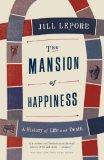Summary | Excerpt | Reviews | Beyond the Book | Readalikes | Genres & Themes | Author Bio

Critics' Opinion:
Readers' Opinion:
First Published:
Jun 2012, 320 pages
Paperback:
Mar 2013, 320 pages
 Book Reviewed by:
Book Reviewed by:
Elizabeth Whitmore Funk
Buy This Book
Hannah Bradley's life was in God's hands; her captivity was a blessing, her redemption a lesson. She was far from helpless, but she was pursuing neither happiness nor even happy old age. Hers was a story not of success or failure but of fate: God had chosen to visit her with affliction, and there
was nothing she could do but praise him, remembering Psalms 119:50: "This is my comfort in my affliction: for thy word hath quickened me." Hannah Bradley didn't think of life as a game. There was no game; there was only God, his word, and the quick and the dead.
The first game called Life, in English, wasn't Milton Bradley's. It was the New Game of Human Life, a board game engraved and inked in 1790 by John Wallis, a London printer and mapmaker. Card and table games were fashionable in eighteenth-century London, which is where Hoyle's books of rules were first published. Board games look like maps, and they were made by mapmakers. The first board game sold to children, Journey Through Europe, or the Play of Geography, was printed in London in 1759. The first jigsaw puzzle, Europe Divided into Its Kingdoms, also a map, was sold seven years later. Wallis's New Game of Human Life is a map, too: its life is a journey along a twisty path from birth to death, with eighty-four stops on the road, one for each year.
The notion of life as a voyage goes way back. Plato, in The Republic, wrote about old men as "travelers who have gone a journey." Francis Bacon, in his History of Life and Death, described life as a "pilgrimage through the wilderness of this world." (It might be a long trip, Bacon warned, so be careful not to wear your shoes out: you might need them in the after- life.) In Wallis's game, life is a voyage to salvation, just as it is in John Bunyan's Pilgrim's Progress, first printed in 1678. (Either salvation or that other place: "I saw that there was a way to hell," Bunyan wrote, "even from the gates of heaven.") Your progress is speeded up by virtue and slowed down by vice. Each stop is a "character." You begin at the Infant. Whoever dies first wins. Your reward is to become, at eighty-four, the Immortal Man. There are setbacks at every turn, Jn?a?na Chaupa?r all over again. Land on the Married Man, at the square marked 34 (the thirty-fourth year of your life), and you get to advance to the Good Father, at 56; but land on the Duelist, at 22, and you'll be sent back to age 3, for acting like a child. There is some slight sense of improvement - the acquisition of wisdom, maybe - not unlike that captured in a proverb Benjamin Franklin once printed in Poor Richard's Almanack: "At 20 years of age the Will reigns; at 30 the Wit; at 40 the Judgment."16 The Benevolent Man, age 52, has much to recommend him. Still, there are rogues and knaves all over the board, from the Thoughtless Boy, a ten-year-old, to the Troublesome Companion, at eighty-one. Every age has its folly.
The New Game of Human Life borrowed its board and rules from the Royal Game of Goose, invented in Florence in the sixteenth century, and one of a class called "spiral race games." The oldest spiral race game may be the Hyena Game, played for centuries by Arabs in Sudan, in a groove traced in the sand with a stick. It involves a race between pebbles representing the players' mothers, who leave their village and head to a well at the spiral's center, where they must wash their clothes and return home before a hyena catches them. (A similar game, from ancient Egypt, is known as Hounds and Jackal.) Wallis adapted the spiral race game to the idea that life is a voyage in which travelers are buffeted between vice and virtue. It was this allegory that gave the New Game of Human Life its "UTILITY and MORAL TENDENCY." Parents were instructed to play with their children and "request their attention to a few moral and judicious observations explanatory of each Character as they proceed & contrast the happiness of a Virtuous & well-spent life with the fatal consequences arriving from Vicious & Immoral pursuits." The game is a creed: life is a voyage that begins at birth and ends at death, God is at the helm, fate is cruel, and your reward lies beyond the grave. Nevertheless, to Puritans, who considered gambling the work of the devil, playing a game of life was, itself, an immoral pursuit. As the English poet Nathaniel Cotton put it, in 1794:
Excerpted from The Mansion of Happiness by Jill Lepore. Copyright © 2012 by Jill Lepore. Excerpted by permission of Knopf, a division of Random House, Inc. All rights reserved. No part of this excerpt may be reproduced or reprinted without permission in writing from the publisher.





The Flower Sisters
by Michelle Collins Anderson
From the new Fannie Flagg of the Ozarks, a richly-woven story of family, forgiveness, and reinvention.

The House on Biscayne Bay
by Chanel Cleeton
As death stalks a gothic mansion in Miami, the lives of two women intertwine as the past and present collide.

The Funeral Cryer by Wenyan Lu
Debut novelist Wenyan Lu brings us this witty yet profound story about one woman's midlife reawakening in contemporary rural China.
Your guide toexceptional books
BookBrowse seeks out and recommends the best in contemporary fiction and nonfiction—books that not only engage and entertain but also deepen our understanding of ourselves and the world around us.